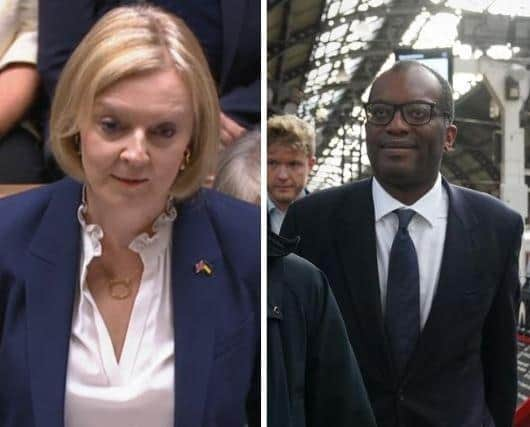Truss and Kwarteng to meet with OBR amid market turmoil as ONS says UK economy grew in second quarter
Treasury and Downing Street sources hit back at suggestions it was an emergency meeting, but it comes after days of chaos in the financial markets and fears of rocketing mortgage bills sparked by the Chancellor’s mini-budget last week.
Today it was announced that the UK economy grew 0.2% over the three months to June after a previously estimated decline in GDP was revised upwards, the Office for National Statistics has revealed.
Advertisement
Hide AdAdvertisement
Hide AdIn a nonetheless unusual move for a prime minister, Ms Truss will join Mr Kwarteng in meeting Richard Hughes, the head of the independent spending watchdog pushed to the fore amid the political and economic fallout from Friday’s mini-budget.


News of the meeting was welcomed by Tory MPs, who expressed hope that it could mark the start of process to win back the confidence of the financial markets.
Chair of the Treasury Select Committee Mel Stride, one of the growing caucus of Conservatives with concerns about the Government’s plans, urged the meeting to be a “reset moment”, echoing earlier calls from fellow Tory MPs for a “plan B” from the Government.
Mr Stride was also among those calling on Mr Kwarteng to bring forward his planned statement setting out how he intends to get the public finances back on track after the OBR said it could produce a preliminary set of forecasts by October 7.
The Chancellor is currently scheduled to deliver his medium-term fiscal plan explaining how he would get debt falling as a percentage of GDP, alongside the updated OBR forecasts, on November 23.
On BBC Newsnight, veteran Tory MP Sir Geoffrey Clifton-Brown joined those calls, telling the programme that he feared further “turmoil” in the markets if the date of the statement is not changed.
It comes as a YouGov poll for The Times showed Labour opening up a massive 33-point lead over the Conservatives, raising further questions about Ms Truss’ leadership only a few weeks into the job.
Sir Charles Walker, one Tory MP commenting on the poll, admitted that his party could be “wiped out” if an election was called tomorrow.
Advertisement
Hide AdAdvertisement
Hide AdFormer Cabinet minister Julian Smith also urged the Government to reverse course on cut to the top rate of tax, saying it must “take responsibility” for the reaction to Friday’s mini-budget.
Despite the growing unease, both the Prime Minister and Chancellor have said they are still committed to the economic plan, arguing that their £45 billion package of tax cuts is the “right plan” for the economy.
And while declining to comment directly on the economic turmoil created by the mini-budget, Ms Truss told a round of BBC local radio interviews that her administration had to take “urgent action” to kick-start the economy and protect consumers from rising energy costs.
During a visit to an engine plant in Darlington, Mr Kwarteng said the package he announced in the Commons on Friday was “absolutely essential” if the economy was to generate the revenues needed to fund public services.
Fresh details also emerged on Thursday about the lack of an independent OBR forecast to go along with the fiscal event last week, with the OBR revealing that it had prepared a draft forecast for the new Chancellor on his first day in office.
The lack of such a forecast had been one of the issues that reportedly troubled the City after the Chancellor’s announcement.
In a letter to the Scottish National Party’s Westminster leader Ian Blackford and the party’s shadow chancellor Alison Thewliss, Mr Hughes confirmed that the body sent “a draft economic and fiscal forecast to the new Chancellor on September 6, his first day in office”.
He wrote: “We offered, at the time, to update that forecast to take account of subsequent data and to reflect the economic and fiscal impact of any policies the Government announced in time for it to be published alongside the ‘fiscal event’.”
Advertisement
Hide AdAdvertisement
Hide AdHe said that the OBR was not commissioned to produce an updated forecast, but confirmed that it would have been in “a position to do so to a standard that satisfied the legal requirements of the Charter for Budget Responsibility”.
Mr Blackford called the details contained in the letter “utterly damning”.
The Chancellor had on Thursday brushed off suggestions his mini-budget had been a “major economic disaster”, while the Prime Minister told BBC Radio Leeds: “We had to take urgent action to get our economy growing, get Britain moving and also deal with inflation.
“Of course that means taking controversial and difficult decisions but I am prepared to do that.”
The comments came after the Bank launched an emergency government bond-buying programme on Wednesday to prevent borrowing costs from spiralling out of control and stave off a “material risk to UK financial stability”.
It bought up to £65 billion worth of government bonds – known as gilts – at an “urgent pace” after fears over the Government’s tax-cutting plans sent the pound tumbling and sparked a sell-off in the gilts market, which left some UK pension funds teetering on the brink of collapse.
On Thursday, the pound regained some ground, rising to above 1.1 dollars for the first time since last Friday.
However, the FTSE 100 dropped around 2% to 6,864 – its lowest point since March this year, amid a global sell-off, while yields on the UK’s 10-year gilts were up to 4.14%.
Advertisement
Hide AdAdvertisement
Hide AdSpeaking in Northern Ireland, the Bank’s chief economist, Huw Pill, underlined warnings that they would have to sharply raise interest rates, noting that there was “undoubtedly a UK-specific component” to recent market movements.
His comments contrasted with Ms Truss who, in her interviews, blamed “Vladimir Putin’s war in Ukraine” for pushing up global energy prices.
